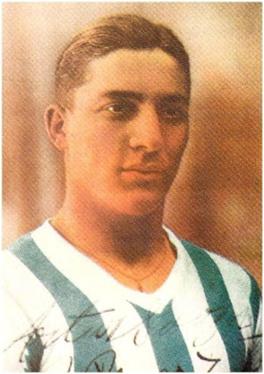Profile of Portugal's first football legend
Long before the emergence of Portugal's greatest ever footballer, Cristiano Ronaldo, Madeira had spawned another truly astonishing player.
Beginning his career at Club Sport Marítimo, Artur de Sousa, known in the football world as Pinga, would play for the islanders for three seasons before crossing the Atlantic to ply his trade at northern powerhouse Futebol Clube do Porto.
Over 16 years at Porto, the adept forward and inside-left midfielder extraordinaire etched his name as the first legendary figure in Porto’s illustrious history.
Mitchell Rua profiles the driving force behind the famous "Three Noon Devils".
Name: Artur de Sousa - Pinga
Date of birth: 30/07/1909
Place of birth: Funchal, Madeira
Position: Forward, left-midfielder, winger
International caps: 21 (9 goals)
Career span: 1929-1946
Clubs: Marítimo and FC Porto
From Madeira to Porto
Pinga first came to nationwide fame in the green and red of hometown club Marítimo (where he would later have a street named after him in Funchal) in 1930, and he was still playing for the Madeiran club when he earned his first call-up to the national team against Iberian rivals Spain.
Catching the eye of Portuguese footballing powerhouse Futebol Clube do Porto, Pinga landed on the mainland on 23 December 1930, debuting two days later amidst a flurry of surreptitiousness over his signing. The press raised various doubts as to the transfer’s legality, with Stadium magazine pointing at suspected irregularities in the signatures, finishing with a curious statement: “The Porto Football Association is rich in mysteries…”
Pinga would become the cornerstone upon which a side of revolutionary proportions was built, embodying the notion of altruism and garnering the admiration of all those around him. His competitive and winning mentality soon came to the fore in Porto’s run to the Campeonato de Portugal in 1931/32 (a competition that would morph into the Taça de Portugal – the Portuguese Cup), where the Blue and Whites (pictured below) recorded a 3-0 win over eternal rivals Benfica, inspired by Pinga.
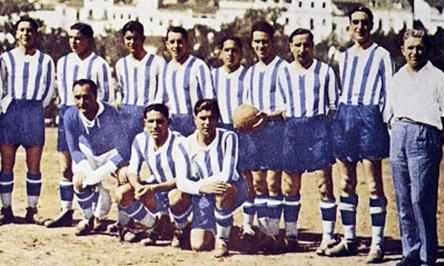
The chronicler of Stadium wrote: “I am glad to record, as an example and something to praise, the way Pinga plays. He is the man who never stops; always in defence or in attack, dribbling, passing and intercepting, whilst never committing violence. Pinga is the complete player; a master of technique, he combines all his attributes to perform the most elegant way to play.”
Accounts of his effectiveness are backed up by the stats. The prolific goalscorer would go on to play 241 recognised senior matches for club and country, scoring 153 goals in the process (zerozero.pt), with other sources insisting the numbers are as high as 400 total games and 394 goals!
Also known as “the Pearl of the Atlantic”, a nickname he shares with the island of his birth, Pinga would garner praise from all four corners of the Portuguese peninsula, with the much esteemed former Seleção player, journalist and founder of footballing paper A Bola, Cândido de Oliveira saying: “Pinga is perhaps the greatest talent of our football, an extremely vivacious and truly brilliant player.”
Lion slayer
During his allegiance with the Dragons during the 1930s and 40s, Pinga took a particular liking to one opponent – Sporting Clube de Portugal – against whom he scored more goals than any other player. The Lisbon side would concede twelve goals against the Madeira-born wonder, with six of those efforts coming in just two matches.
Pinga marked his debut against Sporting with a hat-trick at the Estádio do Lima in the 1934/35 season, which ended in a 4-2 victory for FC Porto as they went on to become the champions of Portugal in the inaugural Primeira Liga as we know it today.
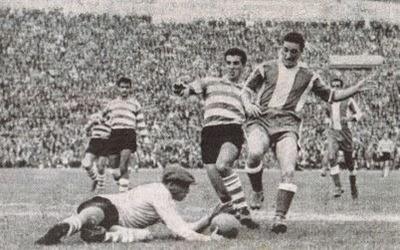
He would be at it again the following season, scoring three of the ten goals as the Dragons earned their biggest ever margin of victory over Sporting, as the game finished 10-1. Pinga would go on to top the goal-scoring charts that campaign, although his side would have to settle for second spot as they fell a point behind champions Benfica.
The “Three Noon Devils”
Although the likes of Eusébio’s Benfica of the 1960s to early 70s, and Sporting’s Cinco Violinos of the late 1940s to 1950s dominate Portuguese footballing folklore, FC Porto had its own contingent of mythical proportions, harking further back to the 1930s, coined Os Três Diabos do Meio-dia, which in English translates to The Three Noon Devils.
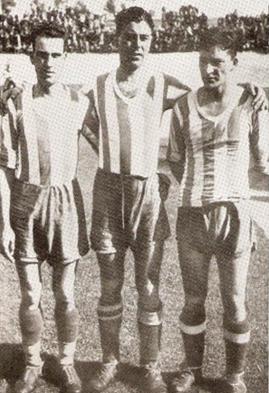
The collective name dates back to 1933 as the brilliant trio of players were the driving force behind an FC Porto team that defeated some of Europe’s strongest teams in a series of matches that kicked off at midday. Pinga (pictured right) lined up on the left side of a midfield alongside Acácio Mesquita (pictured centre) and Valdemar Mota (pictured left).
The triumvirate would lead the Dragons to the Portuguese League on three occasions (1934/35, 1938/39 & 1939/40) and the Portuguese Cup twice (1931/32 & 1936/37).
It can be argued that history will record the trio’s highest point as the 1934/35 season, as they propelled FC Porto to a title that can never be taken away from them: champions of the very first national championship. The team, led by Joseph Szabo, finished the season with 43 goals in a league consisting of eight sides, averaging more than three goals a game, largely contributed by Pinga and his two fellow Noon Devils.
The Three Noon Devils were the core of the first FC Porto side to truly make its mark on Portuguese football. On the eve of his farewell from the beautiful game, Pinga affirmed such sentiments: “The three of us was what playing football was all about. Excuse the vanity, but no three footballers can ever be arranged that will combine as perfectly as us, even if we didn’t know how it came to be.”
The end of an era
After marking a decade in memorable fashion, the 1940/41 season would signal Pinga’s last hurrah and chance at the Portuguese title, as the Dragons finished second to Benfica by three points. The following season Pinga and co. would be trounced by their eternal rivals Benfica 12-2 en route to a title win for the Eagles.
That mismatch can be considered a watershed, heralding Lisbon’s dominance of Portuguese football, with the inception of Sporting’s Cinco Violinos (Five Violins) led by prolific Peyroteo, Belenenses’ Três Torres de Belém (Three Towers of Bethlehem), which won their sole Portuguese league title in 1945/46, and Benfica’s subsequent hegemony all pushing Pinga into the background.
Farewell to a Legend
Pinga played his final game for the national team on 1 January 1942 after 11 years of service, having only missed one game in that time. Portugal’s greatest pre-war player would wave his final goodbye as the skipper in a 3-0 victory over Switzerland.
On 7 July 1946 at the Estádio do Lima, Pinga made his final farewell, leaving a club, a city and a legion of supporters in tears as they waved white handkerchiefs upon his farewell (a very different sentiment to the gesture’s significance in the modern game). The legend continued to work at the club, serving as a youth coach until his untimely death on 12 July 1963 at the age of just 53.
Exemplifying the impact of the player on domestic football, the waning of Pinga’s incredible football talent and his retirement in 1946 led to a 16-year barren spell during which FC Porto failed to win a league title, which only ended in the 1955/56 season, a decade after the Madeiran had left the pitches.
Porto’s greatest?
Pinga was unquestionably one of the greatest footballers of his generation. A sharp shooter with a lethal left foot, he was an expert in the feint, with an astute first touch and tight control on the turn, his skillset complemented by a tireless work ethic that made him equally effective in attack and defence.
His enduring brilliance puts him firmly in the same company of the very greatest Portuguese football legends of yesteryear, alongside Eusébio, Mário Coluna and Peyroteo.
It is unlikely that FC Porto and Portuguese football will ever again see the combination of passion, brilliance, finesse, loyalty and undiluted love for his club. Pinga bled blue and white.
“My muscles may weaken, but my heart will continue to fight for FC Porto and the city of Porto” (Pinga, 1909-1963)
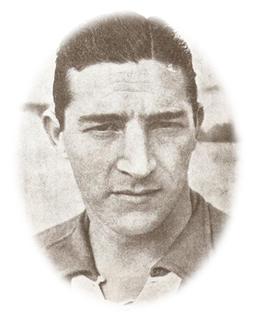
By Mitchell Rua
For more from Mitchell (twitter: @Tripeiro87) check out his new site Tripeiro Nation and read his work on PortugalFutbol.net
